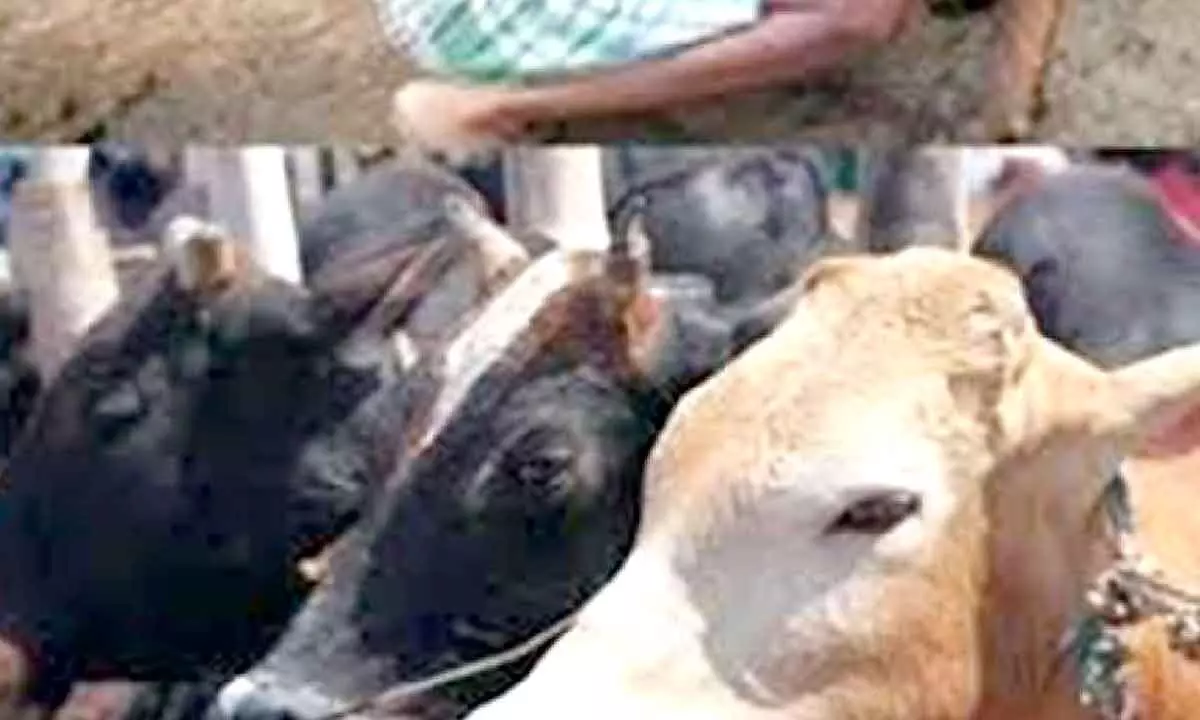Live
- Chandrababu extends Sankranti greetings to Telugu people
- Piyush Goyal urges cleantech sector to go for self-sustaining innovations
- Yogi flags off 100 new buses for Mahakumbh devotees
- Yemen's Houthis to 'pay heavy price' for attacking Israel, warns Netanyahu
- Yogi inaugurates UP Darshan Mandapam
- AAP, BJP cross swords over Purvanchali voters
- Ram Mandir a symbol of faith for generations: HM Shah on 1st anniv of Pran Pratishtha
- Congress Faces Internal Strife as Activists Disagree at Vadde Obanna Birth Anniversary Event
- Comic Con India’s much-awaited 12th edition to be held on Jan 18-19
- Police making efforts to recover weapons disposed of by Maoists: HM
Just In
6.5 cr rural families involved in dairying not getting fair price


Union minister Amit Shah said on Tuesday that 6.5 crore rural families involved in milk production are outside the ambit of the cooperative sector and face exploitation as they are not getting a fair price.
Anand (Gujarat): Union minister Amit Shah said on Tuesday that 6.5 crore rural families involved in milk production are outside the ambit of the cooperative sector and face exploitation as they are not getting a fair price. Shah said that only 1.5 crore out of 8 crore rural families involved in dairy farming are part of the cooperative sector and asked the National Dairy Development Board (NDDB) to ensure that they all get the full value of their produce.
The Union Cooperation Minister addressed a function in Anand, Gujarat, to mark the Diamond Jubilee Year of NDDB and the birth anniversary of Tribhuvandas Patel, the founder of the AMUL cooperative. “Today 8 crore rural families produce milk daily, however, only 1.5 crore have joined the cooperative sector. This means the remaining 6.5 crore are still being exploited, they are not getting a fair price. Many times, they have to throw away milk,” Shah said.
Our job is to ensure that all 8 crore farmers get the full value of their hard work through the cooperative sector, and NDDB should move forward in this direction, Shah said. Shah paid tribute to Tribhuvandas Patel, the founder of Kaira District Co-operative Milk Producers Union Limited, popularly known as Amul Dairy who was instrumental in setting up NDDB.
“Patel didn’t care about himself while working with a unique idea to empower poor farmers, especially women associated with dairy farming. The real reason why women farmers are achieving so much today is due to the cooperative revolution,” he said.
The Gandhinagar MP recalled that Prime Minister Lal Bahadur Shastri had visited Amul in 1964 and decided that farmers across the country benefit from the idea, concept and the successful experiment, leading to the foundation of NDDB in Anand. Shah noted that the products of Amul and NDDB are not adulterated because these organisations are owned by farmers.
“Over the 60 years, NDDB has not only empowered farmers, especially women agriculturists, and cooperatives across the country but also organised them and made them aware of their rights,” Shah said. The trust generated by various cooperative brands such as Amul has empowered women and also laid the foundation for empowering citizens by providing nutrition to children, the Union Cooperative Minister said.
These cooperative movements expedited rural and national development and also worked towards making agriculture self-reliant, he said. Shah said NDDB became a cooperative body in 1987, and from 1970 to 1996, it worked sincerely on the Operation Flood plan and converted it into the White Revolution. “Had it not worked professionally, we may not have achieved the result,” he said, adding that NDDB has started processing vegetables and fruits and beneficiaries being given cheques. Centre’s Govardhan Yojana has brought about multifaceted change by helping to save soil, making farmers prosperous and working for a clean environment, Shah said.
“Cooperative ministry has set up three national-level cooperatives, one for the conservation and promotion of pure and sweet seeds, second for selling organic produce using ‘Bharat’ brand to the world markets, and third for the export of cooperative products,” he said. India now has 22 state-level unions, 231 district unions, 28 marketing dairies, and 21 milk-producing companies, he said.
“We are going to create 2 lakh new cooperatives ...Currently we have 65,000 primary agricultural cooperative societies (PACS) which we want to increase to 2 lakh. This move will not only strengthen PACS but will also increase village cooperatives. “If PACS are strong, then district cooperative banks will be strong. And if DCBs are strong, then state cooperative banks will also become strong,” Shah said. The basic work is to create primary cooperatives, he noted.
“India is the world’s biggest milk producer today. With the 231 million ton production, India has left the US behind to become number one in the world. With a growth rate of 6 per cent against 2 per cent in the world, it will sustain,” Shah said. He said many state governments have signed MoUs with NDDB. While work is progressing well, it needs to be expedited. Shah said all the dimensions of White Revolution 2.0 have been included to strengthen 1 lakh new and existing dairies and expand milk routes. On the occasion, Shah laid the foundation stone for a new NDDB office building in Anand and other projects such as Mother Dairy’s Fruit & Vegetable Processing Plant in Itola, Vadodara, and IDMC Ltd Polyfilm Plant in Narela, Delhi. He also launched Gir Ghee from Mother Dairy and Badri Ghee from Uttarakhand Cooperative Dairy Federation.(PTI)

© 2025 Hyderabad Media House Limited/The Hans India. All rights reserved. Powered by hocalwire.com






